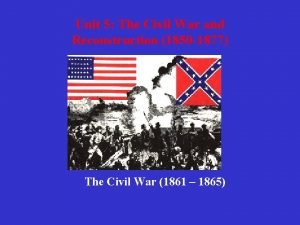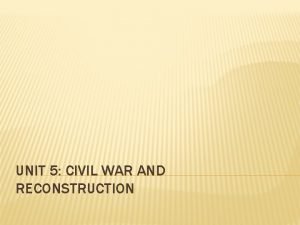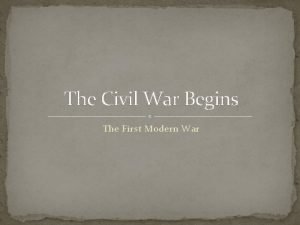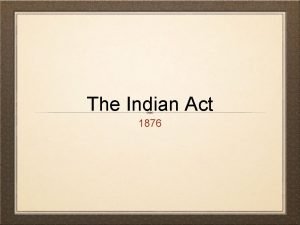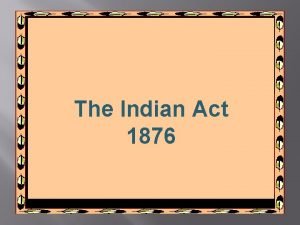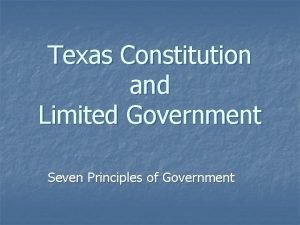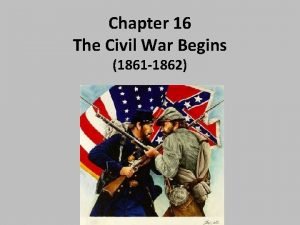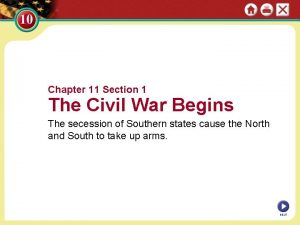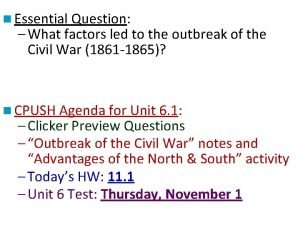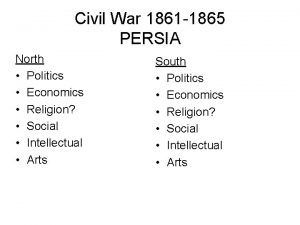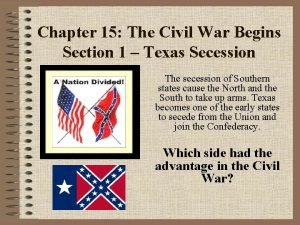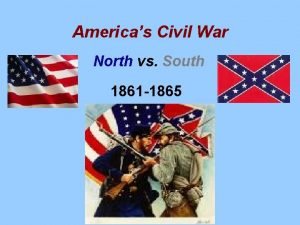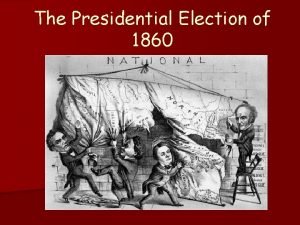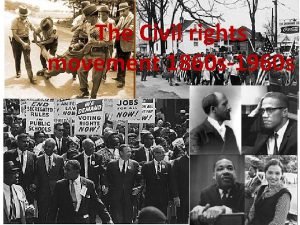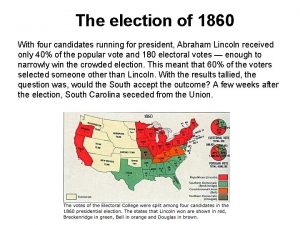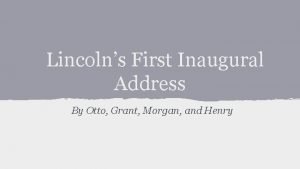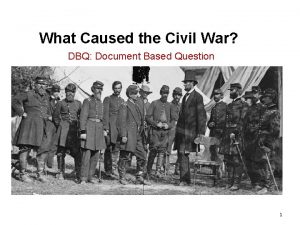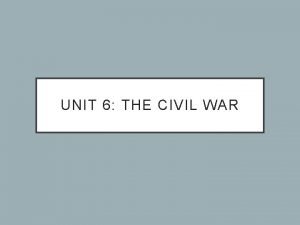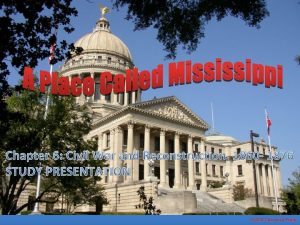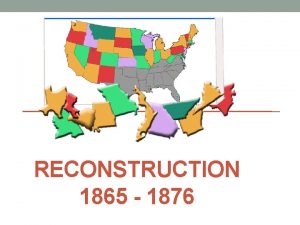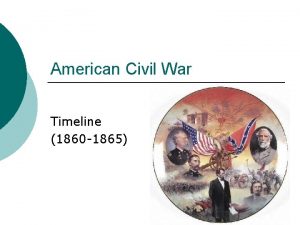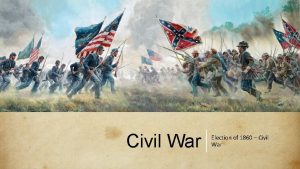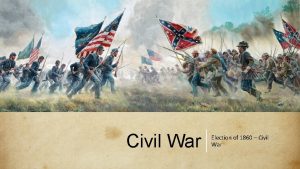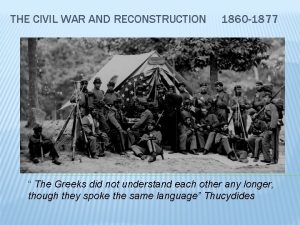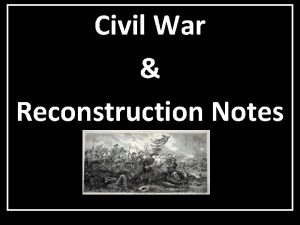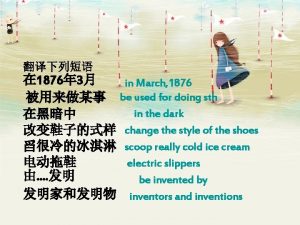Chapter 6 Civil War and Reconstruction 1860 1876




















































- Slides: 52

Chapter 6: Civil War and Reconstruction, 1860 - 1876 STUDY PRESENTATION © 2013 Clairmont Press

Section 1: General Grant at Oxford Section 2: The Vicksburg Campaign Section 3: Reconstruction and Reunion, 1865 - 1876

Section 1: General Grant at Oxford Ø Essential Question: How did strategies change as battles were fought during the Civil War? 3

Section 1: General Grant at Oxford Ø What terms do I need to know? • • bivouac casualties battery forage 4

Section 1: General Grant at Oxford Ø The objective of the Vicksburg campaign was to capture the city and gain control of the Mississippi River. Ø During this time, soldiers under Ulysses S. Grant were marching toward Vicksburg. They eventually established a post at Holly Springs. Ø Grant couldn’t move toward Vicksburg anymore, so he decided to move down the river and take Vicksburg by naval assault. Vicksburg National Military Park 5

General Grant at Oxford: Battle of Shiloh, April 6 -7, 1862 Ø Confederate soldiers were ordered to protect the railroad intersection known as the “Crossroads of the South. ” Ø In April of 1862, Grant met the Confederate army at Shiloh. Ø The Battle of Shiloh was one of the bloodiest battles of the Civil War. Ø On April 7 th, the battle changed and General Grant’s army, who had been reinforced overnight, won the battle. Ø On each side, there were over 11, 000 casualties. 6

The Importance of Vicksburg Ø Grant resumed the march toward Vicksburg. He was determined to reopen trade on the Mississippi River. Ø Vicksburg’s location on a high bluff allowed complete control over who was able to travel along the river. Ø The Confederates used their shore batteries to control the river. Ø Vicksburg’s capture was very important to the Union military. 7

Farragut Fails to Capture Vicksburg Ø David Farragut captured New Orleans in 1862. Ø He sailed his fleet up the Mississippi River. Ø He began an attack on Vicksburg that lasted almost 2 months. Ø Eventually he passed Vicksburg where he was joined by federal gunboats. The two combined their forces and attacked the city. Ø Farragut eventually realized that he wouldn’t be able to take control of the city. Ø He tried to dig a canal around the city, but even that attempt failed. Ø Soon, Farragut was forced to forget his attacks and move back down the river. 8

Pemberton Placed in Command of Vicksburg Ø October 14 th, 1862: Confederate General John C. Pemberton was ordered to hold Vicksburg at all costs. Ø He was given a hopeless assignment and to make things worse, he would soon meet the Union army. 9

General Grant Occupies Oxford Ø In 1862, Grant established an army supply depot at Holly Springs. Ø Soon Grant would make his long march to Vicksburg. Ø That December, Grant’s army moved south and occupied Oxford. 10

General Grant Occupies Oxford: Mrs. Grant Almost Captured at Holly Springs Ø In December of 1862, Mrs. Grant and her son went to Holly Springs to spend Christmas with General Grant. Ø On December 20 th, a Confederate cavalry unit came to kidnap Mrs. Grant. Ø There was just enough warning to get her and her son out of Holly Springs before Confederate troops came in.

General Grant Occupies Oxford: What Grant Learned at Oxford Ø When he lost his supply base at Holly Springs, Grant sent his men out in a 15 mile radius to find food. Ø He was amazed at the amount they brought back. Ø He learned he could live off the land. This discovery shaped the future military campaigns of the Union.

Section 2: The Vicksburg Campaign Ø Essential Question: How did the Vicksburg Campaign affect the Civil War? 13

Section 2: The Vicksburg Campaign Ø What terms do I need to know? • Grierson’s Raid • siege • Emancipation Proclamation 14

Section 2: The Vicksburg Campaign Ø January 29 th, 1863 - Grant established his headquarters north of Vicksburg. Ø Grant ordered General Sherman to dig a canal between the two main channels of the river. Ø Sherman’s attempt, like Farragut’s, failed. Ø Grant was forced to abandon the idea. 15

Yazoo Pass Expedition Ø Grant ordered his men to blow up the levee at Yazoo Pass. Ø Grant reasoned that an explosion of so much water would fill an old channel that connected the Mississippi to Moon Lake, meaning he could transport his troops to get to the high ground above Vicksburg. Ø Although the dynamite broke the levee on February 3, 1863, the Confederacy’s General Pemberton was able to block the invading Union troops. 16

Grant’s Bold and Daring Maneuver Ø General Grant decided to march his troops down the Louisiana side of the Mississippi and to cross it south of Vicksburg. Ø The land south of the city was less swampy. Ø Grant believed he could use his troops to make attack on land. Ø He would then need to have Admiral David Porter to run his ships past the Vicksburg batteries and meet Grant south of the city. Ø When Grant told Sherman about his plan, he opposed it because it was so risky. Ø The plan was also dangerous because it could cut the army off from its supply lines. Ø Even with all the risks, Grant believed the prize of Vicksburg was even greater. Ø He knew that if he could capture Vicksburg, trade and travel along the Mississippi would be open for Union troops. 17

Grierson’s Raid, April 17 - May 2, 1863 Ø Grant’s maneuver was initiated on March 29, 1863. Ø Grant created diversions to try to keep the attention off of his huge army as it migrated south. Ø The most important of these distractions was a cavalry raid led by Colonel Grierson. Ø The purpose was to cause part of the Confederate army to follow Grierson. Ø They were also supposed to destroy railroad lines that connected to Vicksburg.

Porter Runs the Guns of Vicksburg ØOn April 16 th, 1863, Rear Admiral Porter and the 8 gunboats under his command passed the shore batteries at Vicksburg and met Grant. ØBy the end of April, Grant had moved his entire army of 24, 000 men to the appointed meeting place. ØIn early May, General Sherman’s army joined Grant and the attack on Vicksburg began.

Grant Closes in on Vicksburg Ø Confederate President Jefferson Davis ordered 10, 000 troops to reinforce Pemberton’s army. Ø When Grant learned about this, he captured the city of Jackson to prevent the two forces from linking up. Ø He burned several buildings and destroyed the railroads around Jackson. Then he began marching toward Vicksburg.

Battle of Champion Hill, May 16, 1863 Ø The Confederate general was ordered to put his troops between Vicksburg and Jackson so they could try to stop them. Ø As the troops were moving, they encountered the Union army. Ø Eventually, the battle of Champion Hill was won by the Union, who chased the Confederate soldiers. Ø General Pemberton made the mistake of withdrawing all of the citizens and military men into the walls of Vicksburg.

What Sherman Learned at Vicksburg Ø While Grant and Sherman observed the Union soldiers surrounding Vicksburg, Sherman realized that this was the first positive assurance he’d had that the Union would win the war. Ø Sherman learned that the men could live off the land, and he did so. 22

The Siege of Vicksburg, May 19 - July 4, 1863 Ø Grant put his forces all around Vicksburg and prevented any goods or supplies from entering the city. Ø Grant and his army waited 47 days for the city to use up all their supplies. Ø On July 4 th, 1863, Grant and Pemberton agreed on the terms of surrender. 23

Sherman’s March Through Mississippi, February 3 - March 4, 1864 Ø Union officers realized that the Confederate army was still a threat. Ø Sherman was ordered to destroy the railroads to cut off the supply lines. Ø By March 4, Sherman and his troops had made their way to Vicksburg. Ø Along the way they burned supplies they could not carry and took food from the land. Ø Their goal was to not only destroy the railroads, but to destroy any supplies the Confederates could possibly use. Ø Sherman completed his mission and returned to Chattanooga. From there, he went on to make his famous march through Georgia. 24

The Day of Jubilee Ø On January 1 st, 1863, President Lincoln instated the Emancipation Proclamation. Ø This freed the slaves in all of the southern states. Ø Although it was years before most slaves heard about this new freedom, this day was known as the Day of Jubilee. Ø It was a very cheerful time for many slaves and abolitionists.

Mississippi Black Troops Ø In the latter half of 1862, many slaves were out of work because agriculture was interrupted by the war. Ø They began to follow the federal troops who gave them food and clothing. Ø Over 17, 000 former slaves joined the Union military during that time. Ø At the Battle of Milliken’s Bend, the troops showed their bravery and courage.

Mississippi Black Troops: The 3 rd United States Colored Calvary Ø This was one of many units formed by the 186, 000 blacks who joined the Union army and navy. Ø This unit fought Confederate forces in May of 1864. Ø About 136, 000 of these men were former slaves.

Mississippi Black Troops: Wilson Brown, Congressional Medal of Honor Winner Ø When David Farragut was in Mississippi in 1862, Wilson Brown boarded his ship and joined the navy. Ø He was sent to New Jersey to train, and eventually he ended up under the command of Farragut. Ø He received the Congressional Medal of Honor on August 4, 1864 for the courage he displayed by putting his personal safety at risk during the Battle of Mobile Bay. 28

The War Ends Ø When the Confederates surrendered Vicksburg, their morale went down significantly. Ø At the same time, one of the South’s most prominent generals, Robert E. Lee, lost a major battle. Ø These two losses were devastating to the Southern morale. Ø The war ended in 1865 with the Union as the victor. 29

Section 3: Reconstruction and Reunion, 1865 - 1876 Ø Essential Question: How was Reconstruction accomplished in Mississippi? 30

Section 3: Reconstruction and Reunion, 1865 - 1876 Ø What terms do I need to know? • • • • Reconstruction disfranchise amnesty freedmen black codes impeachment scalawag carpetbagger Mississippi Constitution of 1868 Ku Klux Klan Mississippi Plan shoestring district redeemers 31

Section 3: Reconstruction and Reunion, 1865 - 1876 Ø There were two phases of reconstruction in Mississippi: • Presidential: policies implemented by President Lincoln and Vice President Andrew Johnson. • Congressional: Congress took over when the southern states wouldn’t obey the president Ø Whites discouraged racial equality and implemented policies to segregate whites and blacks in the South. 32

Presidential Reconstruction, 1865 - 1867 Ø Reconstruction began in 1865. Ø Lincoln planned to issue amnesty to any Confederate soldier who would pledge allegiance to the United States. Ø According to the plan, if 10% of the voters took the oath and created a state government, the state would be able to vote again; but he was assassinated. Ø Lincoln was assassinated before he was able to complete his plan. Ø Former vice president Andrew Johnson took over his plan. He made a few minor changes, and began on May 29, 1865. 33

Governor William L. Sharkey Ø President Johnson wanted to make Reconstruction as easy and quick as possible & appointed provisional governor William Sharkey in MS (and others in south). Ø Sharkey was in favor of the Union during the Civil War. Ø Sharkey was supposed to hold a constitutional convention to get rid of the Secession Ordinance and give rights of citizenship to former slaves (freedmen). Ø At the convention, the secession was nullified, but the issue of former slaves’ rights were left to the new legislature.

The Black Codes Ø Now that all of the slaves were free, Mississippi, along with the rest of the nation, had to establish what freedmen were. Ø Eventually, the Mississippi Legislature came up with the Black Codes, a set of laws that regulated the lives of freedmen. Ø Slave marriages were legalized and children from those marriages were legalized, but there were still very few rights. Ø Mississippi refused to ratify the 13 th Amendment, which abolished slavery. Ø The federal government realized that Mississippi was not going to cooperate. 35

Impeachment of President Andrew Johnson Ø Other states also refused to ratify the 13 th Amendment, so Congress passed the Reconstruction Acts. This became known as Congressional Reconstruction. Ø These transferred the ability to reconstruct the south to Congress. Ø When President Johnson tried to block the Acts, Congress impeached him; but did not convict him and he stayed in office as President. Ø He was not removed from office. 36

Congressional Reconstruction, 1867 - 1875 Ø The South was divided into five military districts. Ø Each district was under the command of a military governor. Ø Mississippi was in the Fourth District. Ø The military governor could remove any public official that he believed was disloyal to the United States. Ø There were three types of “loyal” men during this time: (most white’s who did not pledge loyalty to U. S. Constitution could not vote; the rest did). • Scalawags-those who turned against most southern views and supported Reconstruction. • Carpetbaggers-those who moved to south and wanted land to take advantage of things going on fortune. • Blacks-those freedmen who could now vote and hold office. 37

Congressional Reconstruction, 1867 - 1875: Scalawags Ø Scalawags were white Republicans who wanted citizenship former slaves. Ø In the South, a “scalawag” was synonymous with hate, anger, and frustration to those who opposed racial equality. You were seen as a traitor to the south if you sympathized with northern views and supported freedmen rights.

Congressional Reconstruction, 1867 - 1875: Carpetbaggers Ø Carpetbaggers were northerners who moved to the South during or after the war. Their carpetbag was their suitcase they brought with them and their belongings to come south. Ø These people were viewed as taking advantage of the people in the south and their poor economic condition. Many had good intentions but many took advantage of others and stole land, property, etc. 39

Congressional Reconstruction, 1867 - 1875: Blacks Ø Only a few black officials were literate in Mississippi, so most elected black officials were able to read and write and do their jobs well and were respected to hold office. Many whites resented the fact that freedmen took their former senate and house of representatives spots at the state capitol building. Ø Most were hard-working, honest men. Ø Some white men made their jobs difficult by refusing to cooperate with black officials. Racism was abundant during Reconstruction.

Readmission of Mississippi, February 23, 1870 Ø The new constitution of Mississippi was required to give blacks equal rights and protection by the law. Ø The Mississippi legislature ratified the 13 th and 14 th Amendments when 36 black men were elected to the legislature. Ø After Mississippi performed the tasks necessary to return to the Union, Congress allowed Mississippi to rejoin the Union. Ø Mississippi returned to the Union on February 23, 1870. 41

Ambrose Henderson Letter Ø Few whites could accept the radical changes that were sweeping the nation. Ø The Ambrose Henderson letter reveals the complex relationship between the former slave and his former owner. He describes him as his friend and is recommending him for a job as Circuit Judge. 42

Mississippi Public School System Ø Probably one of the most important achievements of Reconstruction was the establishment of a public school system. Ø Blacks responded well to the idea of public schooling; however, only a few local whites would teach in black schools. Some seen as Scalawags. Ø Since very few blacks were qualified to teach s there were not colleges for teachers then, most teachers in black schools were Northerners. Schools were in separate buildings for white and black schools. Many were on 16 th section land.

Ku Klux Klan ØThe idea of black schools enraged some white Mississippians. ØTerrorist groups formed to discourage blacks and northern teachers from going to school. ØThe most famous of these terrorist groups was the Ku Klux Klan. ØWhen their first tactics did not work, the Klan resorted to violence. ØBlack schools and churches were burned. ØParents of children who attended the black school were sometimes beaten or killed along with the teachers who taught there. Many did not want blacks to be educated and equal to whites. ØStrict laws were passed causing the imprisonment of several Klan leaders. ØActivity died down until the election of 1875.

Administration of Adelbert Ames, 1874 - 1876 Ø Adelbert Ames, a former Union general, was elected governor in 1873. Many southerners still could not vote until they agreed to take loyalty oath to US Constitution. Therefore many blacks were still in office and reforming state laws supporting equality with other whites who were progressive. Ø He was a moderate who wanted to reduce taxes and decrease racial tension. Ø A large number of black officials were elected that year also. Ø Very soon, white Mississippians considered the Republican Party the black man’s party and the Democratic Party the white man’s party.

The Vicksburg Riot Ø In 1874, racial skirmishes were frequent, but by summer time, it was almost uncontrollable. Ø Highly exaggerated reports of a riot spread across the state. Ø Governor Ames was heavily criticized for his handling of the Vicksburg Riot. Many white voters lost faith in him. 46

The “Revolution of 1875” Ø The “Revolution of 1875” was actually the election of 1875. It was so chaotic and riotous that it was called a revolution. Ø Governor Ames sent out troops from the state militia to keep the peace, but that failed because most of the troops were black. Ø To avoid an all out war, Ames agreed to break up the militia. In response, the Democratic Party said that they would try to keep their party members from further violence. Ø It did not discourage whites from trying to intimidate the black voters. 47

The Mississippi Plan Ø Mississippi Plan was devised by the Democratic Party. It was created to guarantee a victory for them in the fall election of 1875. Ø The plan worked and as a result, the Democratic party took over the House of Representatives and the Senate. This caused many black freedmen to lose their seats in the House and Senate and therefore a time of segregation was set to take place. 48

Impeachment of Republican Officials Ø The Democratic Party controlled two thirds of the vote in the Senate. Ø This gave them the ability to impeach any Republican senator they felt was corrupt. Ø After impeaching a few black officials, they brought up charges on Governor Ames. Ø The charges were very political as he hadn’t done anything illegal. Ø Ames resigned in 1876 and John M. Stone became governor. 49

The Shoestring District Ø After the election of 1875, the Democratic Party controlled nearly everything. Ø To minimize the impact of black voters, a district was created which was mostly black, but left the rest of the state with majority white districts. Ø It was spread over a long expanse along the western edge of the Mississippi border where many blacks had lived before, during and after the Civil War. 50

Redemption of Mississippi Ø The Democrats who planned the election of 1875 were called the Redeemers. Ø Many accusations made about the Republican party by the Democrats cannot be supported by facts. Ø No one was ready for the freedom of 4 million slaves. Ø There were political battles between southerners and northerners and between whites and blacks. Ø The “Bourbon Era” of the Democrats followed that chaotic time after the Civil War.

Image Credits Slide 1: allstarecho on Wikimedia Commons; Slide 2: Public Domain Wikimedia Commons; Image Credits slide: Thomas R. Machnitzki on Wikimedia Commons; all others copyright Clairmont Press or public domain. Return to Main Menu 52
 Chapter 6 civil war and reconstruction
Chapter 6 civil war and reconstruction Unit 4: civil war and reconstruction
Unit 4: civil war and reconstruction Civil war and reconstruction study guide
Civil war and reconstruction study guide Quizlet
Quizlet Unit 5 civil war and reconstruction
Unit 5 civil war and reconstruction Reconstruction vocabulary words
Reconstruction vocabulary words Chapter 16 lesson 2 challenges to slavery
Chapter 16 lesson 2 challenges to slavery Civil war first modern war
Civil war first modern war Indian act definition
Indian act definition Indian act 1876
Indian act 1876 Texas constitution of 1876
Texas constitution of 1876 Purpose trust definition
Purpose trust definition 1876 dewey decimal system was introduced
1876 dewey decimal system was introduced Typewriter (1800)telephone (1876)
Typewriter (1800)telephone (1876) Jack london (1876-1916)
Jack london (1876-1916) 6. testu iruzkina
6. testu iruzkina Chapter 12: religion, romanticism, and reform, 1800–1860
Chapter 12: religion, romanticism, and reform, 1800–1860 Civil rights webquest
Civil rights webquest Chapter 16 the civil war begins worksheet answers
Chapter 16 the civil war begins worksheet answers Chapter 11 section 1 the civil war begins
Chapter 11 section 1 the civil war begins The furnace of civil war
The furnace of civil war Second great awakening
Second great awakening Civil war advantages and disadvantages chart
Civil war advantages and disadvantages chart Civil war advantages and disadvantages chart
Civil war advantages and disadvantages chart Civil war advantages and disadvantages chart
Civil war advantages and disadvantages chart North and south states civil war
North and south states civil war North and south states civil war
North and south states civil war Civil war ppt and guided notes
Civil war ppt and guided notes Toro guernica
Toro guernica Chapter 30 the war to end war
Chapter 30 the war to end war Chapter 30 the war to end war
Chapter 30 the war to end war Border states in 1860
Border states in 1860 Puffing billy aspirateur
Puffing billy aspirateur Romantic period american literature
Romantic period american literature Party platform definition
Party platform definition Apush 1820 to 1860
Apush 1820 to 1860 What era was the 1800
What era was the 1800 Decreto 1860 de 1994
Decreto 1860 de 1994 American romanticism 1800 to 1860 worksheet answers
American romanticism 1800 to 1860 worksheet answers South carolina 1860
South carolina 1860 1860
1860 American romanticism 1800 to 1860 worksheet answers
American romanticism 1800 to 1860 worksheet answers Values feeling and intuition over reason
Values feeling and intuition over reason Map of 1860
Map of 1860 Election of 1860 pie chart
Election of 1860 pie chart South africa 1860
South africa 1860 Causes of the civil war dbq
Causes of the civil war dbq Civil war map activity
Civil war map activity North vs south civil war comparison chart
North vs south civil war comparison chart Gtech gettysburg
Gtech gettysburg English civil war timeline
English civil war timeline What led to the civil war
What led to the civil war Civil war facts
Civil war facts




